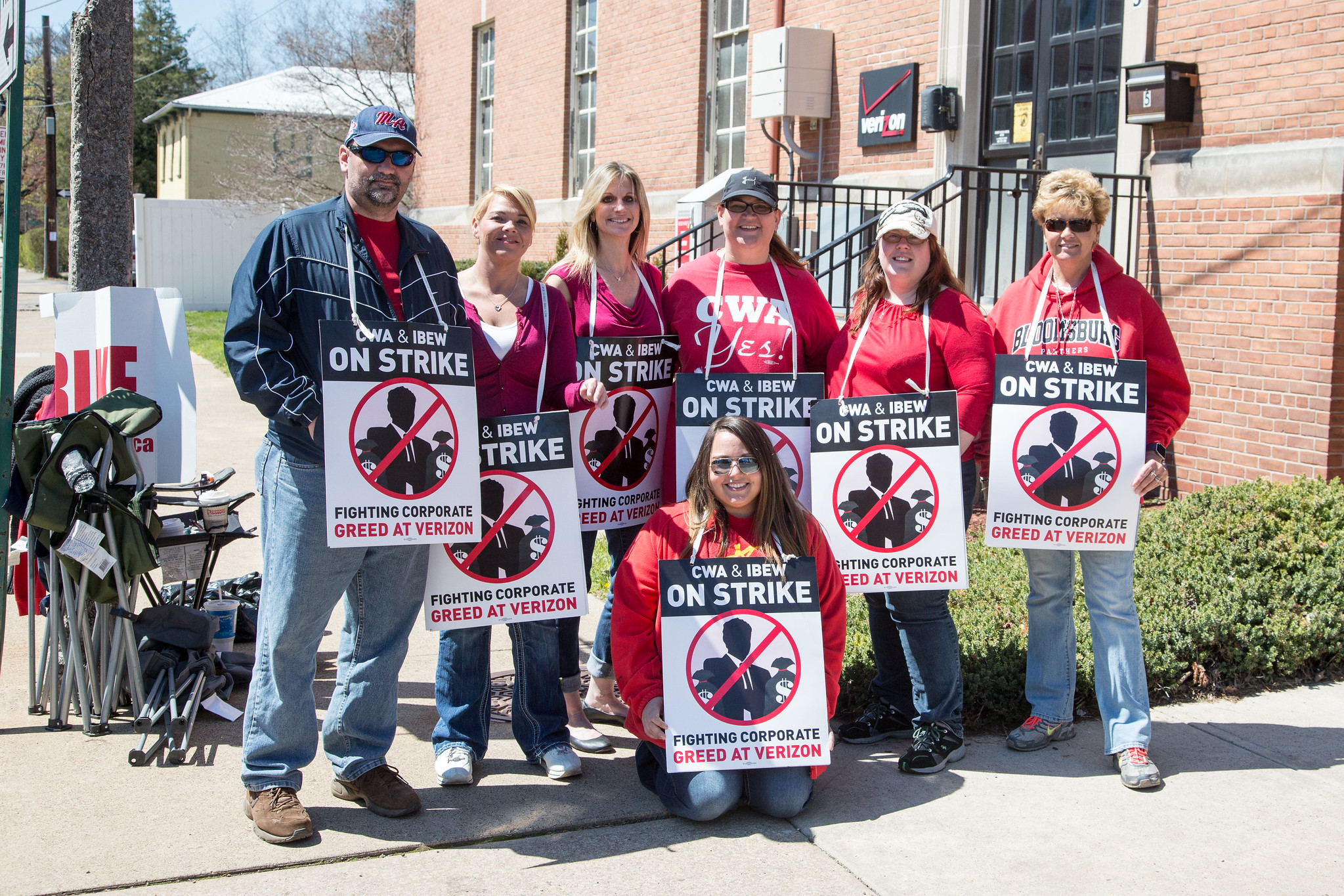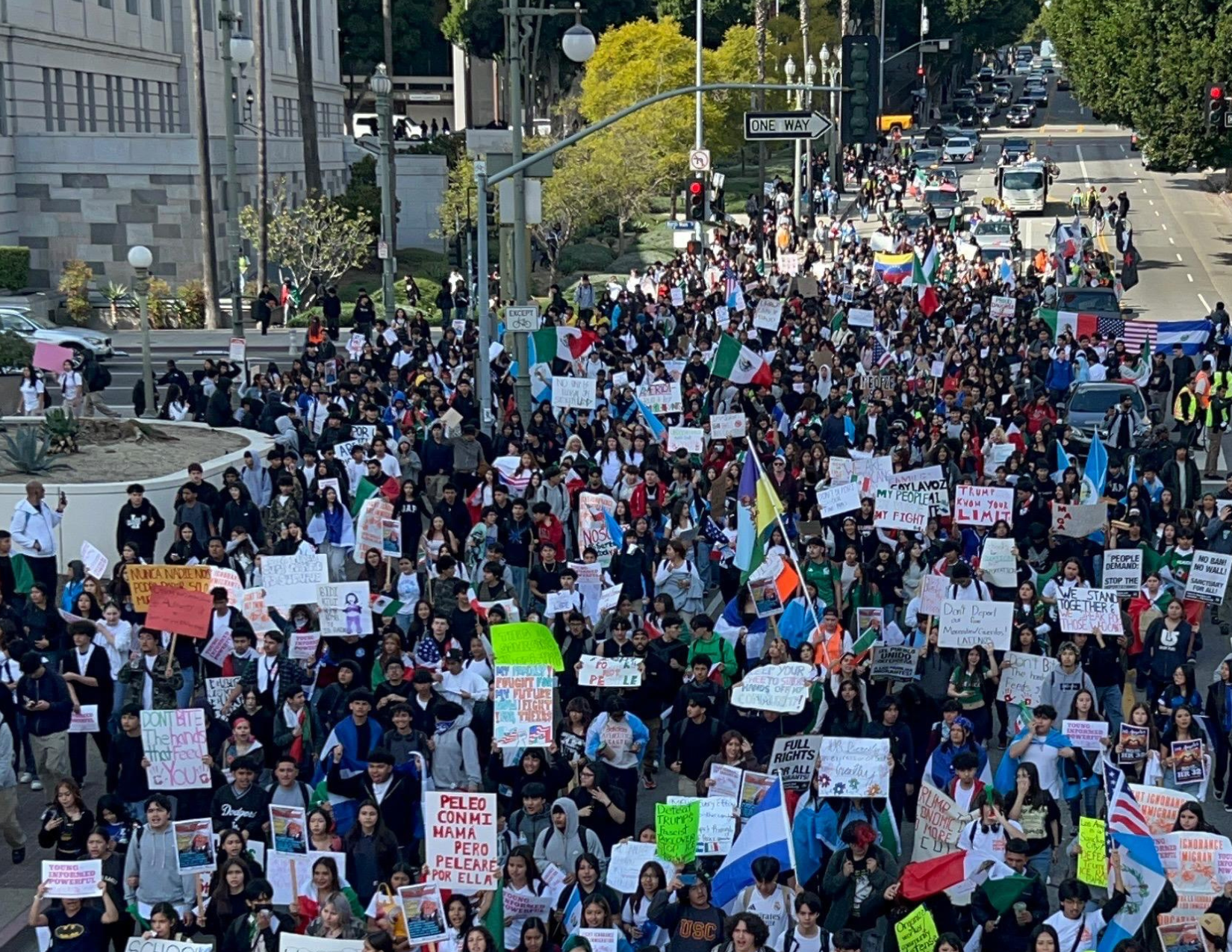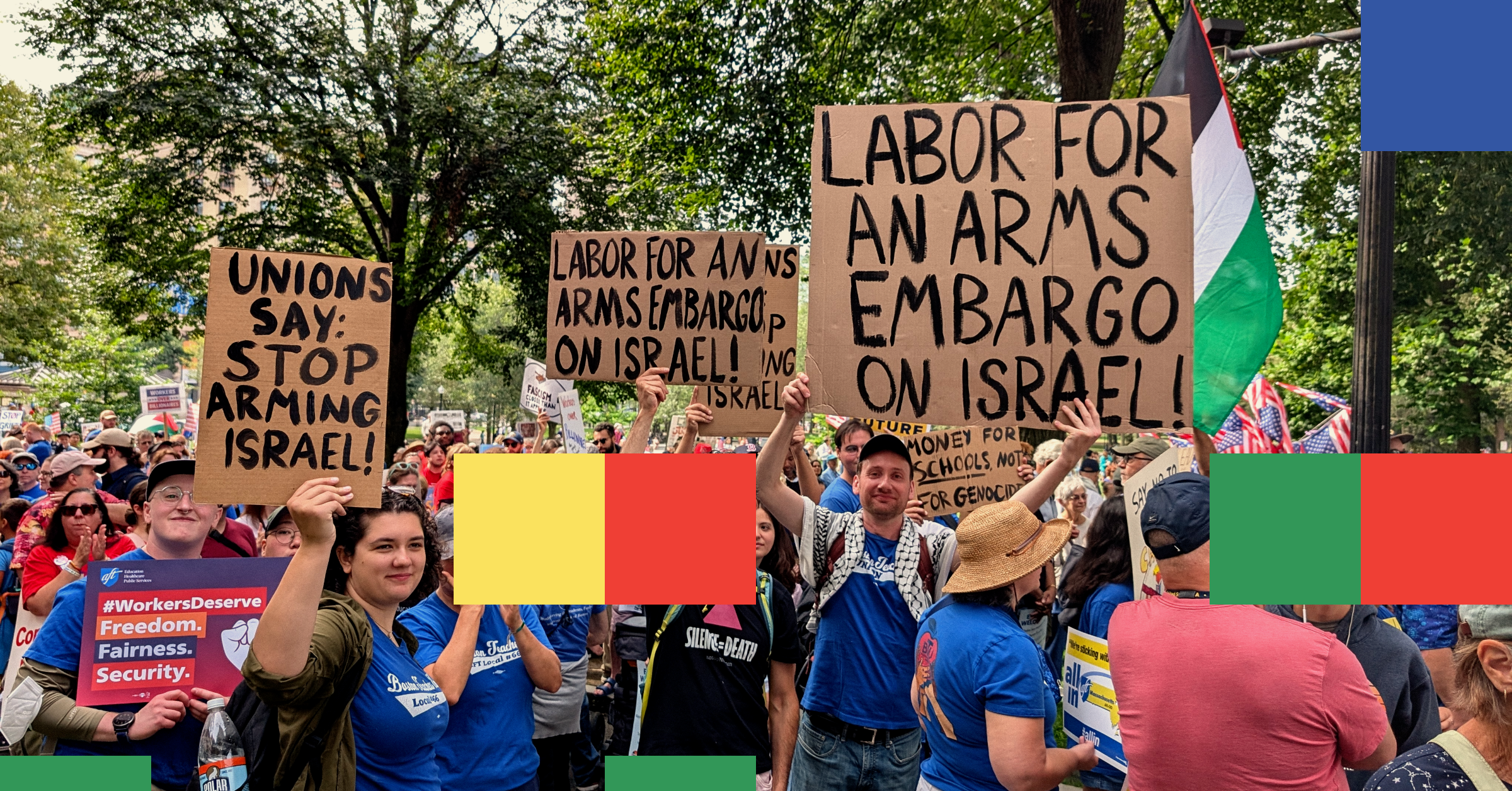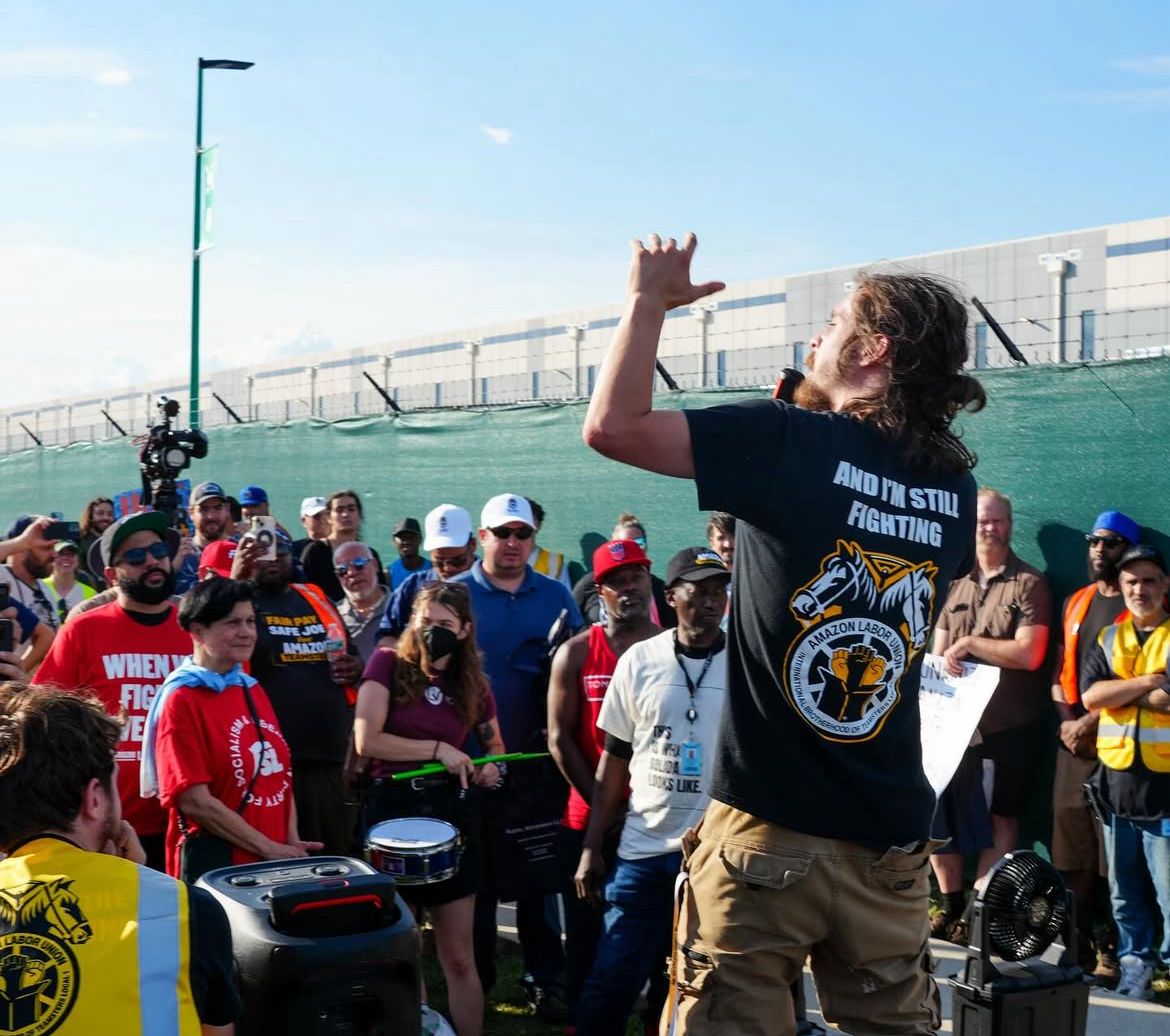Pam started at Verizon (Bell Atlantic at the time) in Manhattan in 1999. She’s a field technician; she first worked in installation and repair and now works in the construction department as a splicer. We asked about her experiences as a longtime telephone worker and union activist. [See this interview with another Verizon activist, who started in 2017.]
What’s your job like day to day?
Field technicians install and repair fiber-optic cables, which provide customers with internet, TV, and voice services. Almost all the work we do now is on fiber. There’s very little copper cable left in Manhattan. Splicers run fiber cables, install fiber terminals in buildings, and fix fiber failures when circuits go down. The fiber runs from the Verizon Central Offices to customers’ locations through manholes, since there are no poles in Manhattan.
To access the fiber, we open the manholes and set up a cube truck. You set up your work area, pull the manhole cover, set up a guard rail, purge the manhole with a blower to air it out, and put in a gas monitor. You have to have two people to work at a manhole, one on top for safety and to hand down tools and equipment. The fiber is glass and delicate, so it’s encased in protective sheathing. Once it’s stripped of the sheathing, it has to be housed in a protective case. We work on the fiber outside the hole, so once you find the fiber case or place the new cable, you take the case out of the hole and both people can work on it up top.
Is it pretty physical?
Yes. Some days are harder than others. Verizon has hired very few field technicians in New York City in the last 20 years, and everybody’s getting older. There’s been no influx of younger workers to do the heavier work. Everybody’s been there for a long time.
Is that good or bad?
Both. It means everyone is experienced and knows each other well, and has a long history with the union as well as the company. But it also means there isn’t an influx of new workers; when people retire they’re not replaced. It would be good to have new people come in, new energy. And it would be good for new people to learn from the workers who have been there for a long time. They have a lot of union experience and work knowledge to pass along.
How did you decide to get a union job?
I worked at two different worker centers organizing Latino immigrant workers, one in El Paso, my first real job out of college, then in New York with the Latino Workers Center, which was just getting off the ground. Those were good experiences but also frustrating. The power the workers were able to build was limited since they didn’t have collective bargaining power and didn’t have the protection of a union. I think unions need to be a major part of any movement for transformative social change, and I wanted to be part of that effort in a long-term way. I also wanted to get a job where I’d learn a skill, and I didn’t want to be in an office all the time.
Why Verizon?
I liked the idea of being a technician, working with my hands and being outside. I knew it was a good union job, though the pay wasn’t good for new hires when I started. I knew it was a job people stuck with for a long time. And I didn’t want a job that would have a really crazy schedule, like transit.
What do you like best and least about the job?
I like seeing parts of the city that most people don’t see. For my first five years, I was in installation and repair in a walking district, and I liked walking around, seeing different apartments and businesses, being outside part of the day but not the whole day.
It’s really been a great job. I like the camaraderie with coworkers. I like the straightforwardness of the job: you have a circuit you have to fix, or something you have to install. Sometimes that takes a day, sometimes it takes longer. It’s clear when it’s done and whether you did it right. When I started, I didn’t have kids. It’s a job where I’ve been able to have a steady schedule and be there in the evenings and weekends with my family. It’s been very stable.
What I don’t like is that I go in to work and often I don’t know what my job for the day is going to be. Sometimes it’s boring. Sometimes it would be nice to have more decision-making power over your day.
Have you experienced particular difficulties, or advantages, being a woman in a majority-male workplace?
I think it’s a less intense environment for women than a lot of the other trade jobs. Reading accounts of women in the trades, I’ve been aware that I haven’t experienced the harassment that many of them describe. But it can definitely be isolating to be a woman in a majority-male workplace. Sometimes I feel not taken seriously or overlooked because I’m a woman. Sometimes I wonder if I’m being dismissed because I’m not one of the guys. I think my co-workers probably talk about things differently when I’m not there. I think having women there can help break the macho culture.
I put a lot of pressure on myself not to be “the girl who didn’t know the job.” Sometimes I overthink things because I don’t want to mess up. I’m not as physically strong as a lot of my co-workers, which doesn’t mean I can’t do the job, but there are parts of it that they’re better at and that I struggle with. Part of that is figuring out the tools you need and ways to do it no matter what your size.
Are there day-to-day things you do that you could describe as political, or is that more peaks and valleys?
An important factor in getting a rank-and-file job is getting a job you think you’ll like and you can do for a long time because most of your time is spent doing the work.
I was on the job for a lot of years when there wasn’t a lot of room to do much with the union. My local was very top-down when I started, and there wasn’t a lot of space for new members to get involved. The old officers didn’t even want people to ask questions at meetings. That was seen as disloyal and troublesome.
I became a steward in 2001, and I learned a lot from other stewards in my shop. There were a number of years in the early 2000s where I put a lot of effort into trying to be a good steward, but I felt pretty constrained by the fact that the officers at the time didn’t want people to rock the boat too much. They didn’t want anyone else to take on leadership roles, and that led to an effort in 2008 where a few chief stewards ran for office. I met them during the 2008 campaign. They lost that election, but it was a first step toward major changes in the local.
I was part of helping build a reform group that ran a full slate in the 2011 election and won. That group consisted of the new officers and members like myself who believed we needed a different leadership and a different way of functioning.
What have been the highlights thus far?
Since I’ve been at the phone company, we’ve struck four times. The 2016 strike was the most significant experience I’ve had in my time as a union activist. Strikes are hard and stressful, but they’re also a time when you feel your power as workers and as part of a collective effort. Things open up during contract campaigns and strikes, and there’s more space for members to be active in lots of different ways.
Coming out of the 2011 strike, most of my coworkers, including myself, felt that strike ended prematurely. The national union agreed to go back with a commitment to “good faith negotiations”; after a year we ended up with a contract most members weren’t happy with.
Going into the 2016 strike, the company’s whole method of managing was based on punitive discipline. Technicians in installation and repair especially were under tremendous stress, getting suspended for 30 days for minor issues. Verizon was on the offensive and making outrageous demands that would have rolled back decades of contract gains. There was a lot of doubt whether the national union would call an open-ended strike, given what had happened in 2011. The number of members in the bargaining unit had declined a ton, big strikes were rare, and the company was painting us as overpaid workers in an era when lots of other workers were getting by with a lot less.
The contract expired in July of 2015. We had a year and a half of contract campaign actions prior to and after expiration, trying to get the company to back off their concessions, with no movement. The company got more aggressive, and it got harder and harder to get members to participate in contract actions. People felt beaten down by the company’s surveillance, the excessive discipline, and the lack of confidence that there would be a strike. When the national union called the strike, there was a 180-degree turn—really overnight. People went from feeling demoralized to feeling we had some ability to affect what was going to happen—and in fact we did have that ability.
It was a decisive moment. Going on strike changed it from something happening to us to something we had the ability to change. It was amazing to see how members stepped up.
What enabled the union to win that strike?
We won that strike for a lot of reasons—it required a major commitment on the national, local, and rank-and-file level, and it was there on all three. The national union ran a great nationwide campaign exposing what Verizon was doing and how outrageous their demands were in the face of the company’s tremendous profits. They made clear the strike was about broader issues of corporate greed and good jobs, not just about Verizon workers. They built a national support campaign that targeted Verizon Wireless stores and hurt the company’s bottom line and public image.
The local leadership was on the ground and moving a mobilization strategy that was very aggressive. In my local, the leadership were people who were elected during the truncated 2011 strike and had a very different approach to the 2016 strike and what the union should be doing. They were at the hotels in the early morning, on the picket lines, traveling to all the different locations, following the work as well. Members saw that, and it made a difference.
The participation from the rank and file was incredible. It built on itself; from the first day, participation was high and momentum kept building. Every day in Manhattan, we protested outside the hotels where the company was housing scabs. Before 7 a.m., you’d see hundreds of strikers in red shirts outside the hotel, raising a ruckus, and usually before too long hotel management would come out and agree to kick out the scabs. We followed the work all over the city, picketed wherever scabs were doing work and the storage units where they were keeping the equipment, info picketed all the Verizon Wireless stores. Other unions adopted Verizon Wireless stores to help bolster our picket lines, and we got tons of public support outside the stores. We held mass rallies and marches that brought strikers together from different locations and helped keep the strike in the press.
This was during the New York Democratic primary race, and Bernie Sanders was in New York in the early days of the strike. Bernie honored strikers at a huge rally in Washington Square Park on the first day of the strike, and a day or two later we held a mass march across the Brooklyn Bridge to the Sanders/Clinton debate. Bernie had a national platform and he used it to talk about how Verizon was a prime example of corporate greed run wild and how the issues Verizon workers were striking over affected everyone. The national attention Bernie brought helped raise the strike’s profile, and helped keep morale high.
What are the advantages of working in a “good job” rather than a marginal job, besides the obvious?
People at the phone company have a deep-seated sense that this is a good job because the union has made it a good job. There’s a reason most members stay for 30 years or more. There’s an awareness that the benefits and job security we have were won through strikes and all the day-to-day, on-the-job organizing that happens in between, enforcement of the contract, filing grievances, building relationships, that’s all essential. There’s a collective sense that it’s a really good job because people before us fought and won those things and we have a responsibility to hold on to that and to not let them slip away. A lot of people have family members who worked for the phone company, they grew up as kids going to those picket lines. But even for those who didn’t, we have that sense of that history and struggle.
There’s a lot of time over the years when things weren’t very exciting or it felt like we were really on the defensive. But 2016 made me realize there’s a lot of ups and downs, and you have to stick it out through it all because you don’t know what’s coming, and sometimes it’s not what you expected.
What’s your advice for people who want to get a union job and want to organize there?
It’s important to be somewhere for a long time and build relationships. It’s important to think about finding a job you’re going to enjoy on a day-to-day basis and that you can do for a long time.
Don’t go into it thinking you know more than the people who work there about how things should be run. Go in with an openness to learn. Recognize that you have a lot to learn from the people who have been there longer than you, in terms of the job, the history of management-worker relations and how things work, the history of the union. It’s important to go in with a perspective that you’re there to learn, to build relationships, be a part of something bigger, and contribute what you can to that collective effort, but there will be lots of stumbling blocks along the way. Don’t be afraid to try and fail.




